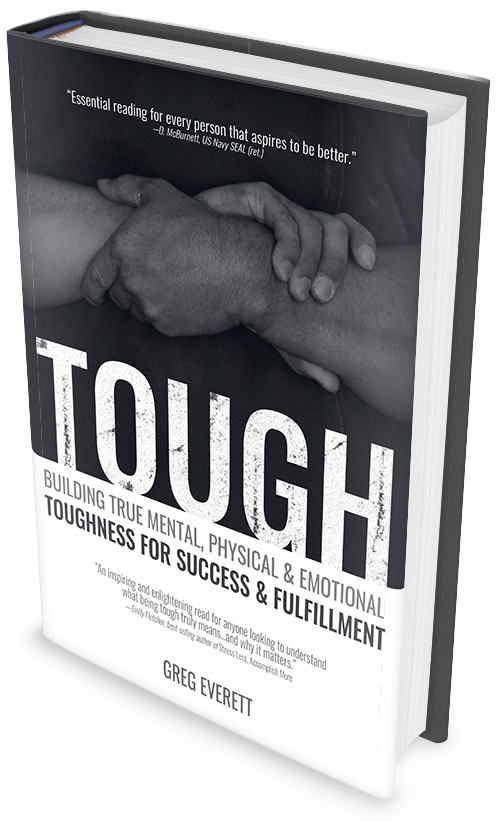Who are you? Who do you want to be? Are you secure in your identity? What are your values? Do those values actually align with the identity you want or believe is you? Do those values in turn align with our vision of being tough?
We can’t make sound decisions that guide our lives in the way we want without establishing a clear identity and its corresponding values. Sadly enough, it’s more common for business owners and executives to engage in the process of defining an identity and core values for a company, and then enforce decisions that align with those values, than for individuals to do the same. Most of us float through life like a fallen stick on a river rather than making clear choices about what we are and where we’re going—we spend our lives describing who we happen to be, not prescribing who we want to be.
Even once you’ve decided—truly—who you want to be, it’s not a passive condition in which that identity simply exists from that point forward. Your identity is shaped by the entirety of its defining characteristics, from your attitude and outlook, to what you say and how you say it, to how and when you choose to act. You are defining your identity every moment of your life with every choice you make—you don’t get to be who you are only on your best days and pretend your poor choices don’t count toward the final analysis. You don’t get to be one person in one crowd, and another elsewhere, then yet another in the mirror—you are the aggregation of all of those personas; and part of that is being someone who has to take on different personas in different circumstances, perhaps to impress or ingratiate or feel safe. In any case, it’s all your identity.
Do your choices, words and behaviors actually reflect and support the identity you’ve decided represents you? Does this identity align with what you want and expect to accomplish? It’s stunning how much discordance can exist within a given individual. One can imagine themselves an elite athlete, yet fail to actually perform the daily tasks demanded for becoming and remaining elite; another can imagine themselves capable, but actively avoid any experiences that may invalidate that self-assessment.
It’s impossible to be tough without knowing who you are and what you value—you can’t stand up for yourself or what you believe if you’re not even aware of what that is. You can’t be committed to nebulous ideas—security requires clarity. This doesn’t mean, however, that your identity must be immediately established in this process and then remain rigidly unchanging indefinitely. You’re continuing to experience life, interact with new people in different ways, gain perspective on not just the world around you, but on yourself, and be forced to adapt and evolve. Being secure in your identity doesn’t mean intransigence—it simply means that you’re aware of who and what you are at the present moment, and you’re actively working to support that identity with the choices you make every day. In no way does it imply that you’re finished with the process of becoming—you never will be.
A lack of security in our identities is a primary driver of irrational and meaningless competition, attention-seeking behavior and inappropriate attempts at validation. How can we be tough if we’re wasting time and energy into trying to convince people around us that we’re valuable? That’s energy and time we need to be investing into the process of actually becoming who we want to be. Even if we believe the opinions of those around us are consequential, people will ultimately and unavoidably respond to who we are, not who we attempt to convince them we are. Our self-delusion about our identities isn’t shared by the rest of the world, and our acting is typically painfully transparent.
Character is built by us by choice (or the failure to choose) and revealed to others unavoidably. We make decisions, consciously or not, on how experiences affect our character. It’s not a passive process we simply allow to define our character while we sit comfortably awaiting a result. Being tough demands action on every level. We don’t have the power to choose all of our experiences, but we always have the ability to choose our behavior in the midst of them and in their wake, and those choices are what define our character.
Character - An Introduction
All content © Greg Everett

